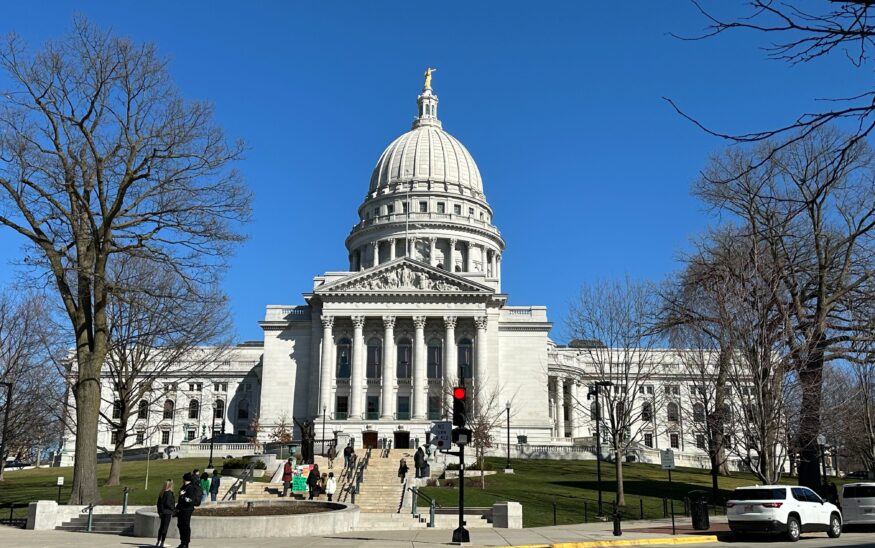Evers signs bills addressing threats against judges
By: Steve Schuster//March 27, 2024//
Three bipartisan bills requested by the Wisconsin Supreme Court in response to threats of violence against judges were signed into law by Governor Tony Evers Wednesday afternoon, according to court officials.
The Judicial Security Package was developed by the Legislative Committee of the Judicial Conference at the request of Chief Justice Annette Kingsland Ziegler, who has prioritized judicial safety.
1 – AB 965: Picketing and Parading (Representatives Tusler and Stubbs; Cosponsored by Senators Wanggaard and Taylor)
2 – AB 966: Judicial Officer Privacy (Representatives Tusler and Ortiz-Velez; Cosponsored by Senators Wanggaard and Taylor)
3 – AB 967: Withholding Judicial Security Profiles from Public Access Representatives Tusler and Ortiz-Velez; Cosponsored by Senators Wanggaard and Taylor)
“Judicial security has been a priority of mine throughout my time as the Chief Justice, particularly so following the senseless murder of Judge John Roemer in 2022. Judge Roemer was murdered at his own home by a man the judge had sentenced to prison years earlier. Unfortunately, this tragic situation is not an outlier. Across the country, threats and acts of judicial violence and intimidation have been on the rise. That reality is unacceptable: it is a basic tenet of judicial independence that judges should not be intimidated, influenced, threatened, or killed for doing their job,” said Ziegler.
As previously reported by the Wisconsin Law Journal, in November, Ziegler kicked off the State of Judiciary Annual Meeting of the Wisconsin Judicial Conference in Lake Geneva with a speech highlighting the challenges and opportunities facing Wisconsin’s legal community — including judicial security.
“Our courthouses must also be safe places to conduct our judicial system business, protecting practitioners and members of the public alike,” Ziegler said in November, noting the murder of Judge Roemer and recent headlines out of Maryland.
“The recent horrific execution of a Maryland judge as he stood in his own driveway at his home continues to remind us of the need to be always vigilant and continue to enhance judicial safety,” Ziegler said in November.
Also as previously reported by the Wisconsin Law Journal, at the State Bar of Wisconsin last Summer, former Wisconsin Courts Director Judge Randy Koschnick urged the need for enhancing the security of jurists.
Less than a year later, sweeping changes have been made in Madison.
“Today (March 27, 2024), I wish to thank our bipartisan bill sponsors and cosponsors for their tireless work to get this package over the finish line. And, I wish to thank Governor Evers for signing our judicial security package into law. I am glad to see that judicial security is supported across the aisle. This package is a much-needed step in the right direction to provide safety and security to our judicial officers. May we all continue to do our part, individually and collectively, to provide a safe court system. We will have more work to do in the days ahead to ensure our judicial officers are safely able to carry out their important work. But today, I pause to celebrate these positive steps,” Ziegler said Wednesday.
According to court officials, the Picketing and Parading bill signed into law makes it a Class A misdemeanor to picket or demonstrate near a justice’s home ‘with the intent to interfere with, obstruct, or impede the administration of justice’ or influence a judge in carrying out their duties. The penalty is up to a $10,000 fine and nine months imprisonment.
Court officials noted the Judicial Officer Privacy bill establishes privacy protections for judicial officers and procedures for judicial officers to request state government agencies, persons, businesses, associations, and data brokers protect their personal information and the personal information of their immediate family. It makes it a Class G felony to knowingly publicly post or display on the Internet personal information about a judicial officer or their family to increase or create a threat to the health and safety of a judicial officer or a family member, and bodily injury or death of the judicial officer or a family member of the judicial officer is a natural and probable consequence of the posting or display.
The final bill signed into law provides an exemption for judicial security profiles used to develop emergency response plans, which include personal details of a judge and family members, from disclosure under the public records law.
Legal News
- Wisconsin attorney loses law license, ordered to pay $16K fine
- Former Wisconsin police officer charged with 5 bestiality felony counts
- Judge reject’s Trump’s bid for a new trial in $83.3 million E. Jean Carroll defamation case
- Dozens of deaths reveal risks of injecting sedatives into people restrained by police
- The Latest: Supreme Court arguments conclude in Trump immunity case
- Net neutrality restored as FCC votes to regulate internet providers
- Wisconsin Attorney General asks Congress to expand reproductive health services
- Attorney General Kaul releases update at three-year anniversary of clergy and faith leader abuse initiative
- State Bar leaders remain deeply divided over special purpose trust
- Former Wisconsin college chancellor fired over porn career is fighting to keep his faculty post
- Pecker says he pledged to be Trump campaign’s ‘eyes and ears’ during 2016 race
- A conservative quest to limit diversity programs gains momentum in states
WLJ People
- Power 30 Personal Injury Attorneys – Russell Nicolet
- Power 30 Personal Injury Attorneys – Benjamin Nicolet
- Power 30 Personal Injury Attorneys – Dustin T. Woehl
- Power 30 Personal Injury Attorneys – Katherine Metzger
- Power 30 Personal Injury Attorneys – Joseph Ryan
- Power 30 Personal Injury Attorneys – James M. Ryan
- Power 30 Personal Injury Attorneys – Dana Wachs
- Power 30 Personal Injury Attorneys – Mark L. Thomsen
- Power 30 Personal Injury Attorneys – Matthew Lein
- Power 30 Personal Injury Attorneys – Jeffrey A. Pitman
- Power 30 Personal Injury Attorneys – William Pemberton
- Power 30 Personal Injury Attorneys – Howard S. Sicula












